Aqua::InputOutput::ArrayVariable Class Reference
An array variable. More...
#include <Variable.hpp>
Inheritance diagram for Aqua::InputOutput::ArrayVariable:
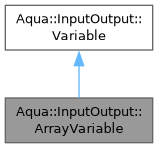
Collaboration diagram for Aqua::InputOutput::ArrayVariable:
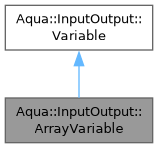
Public Member Functions | |
| ArrayVariable (const std::string varname, const std::string vartype) | |
| ~ArrayVariable () | |
| bool | isArray () |
| Report that the varaible is an array. | |
| size_t | typesize () const |
| size_t | size () const |
| void * | get (bool UNUSED_PARAM synced=false) |
| void | set (void *ptr, bool synced=false) |
| bool | reallocatable () const |
| Get if a variable is reallocatable. | |
| void | reallocatable (bool is) |
| Set if a variable is reallocatable. | |
| PyObject * | getPythonObject (int i0=0, int n=0) |
| bool | setFromPythonObject (PyObject *obj, int i0=0, int n=0) |
| const std::string | asString (bool synced=true) |
| const std::string | asString (size_t i, bool synced=true) |
| Public Member Functions inherited from Aqua::InputOutput::Variable | |
| Variable (const std::string varname, const std::string vartype) | |
| Constructor. | |
| virtual | ~Variable () |
| Destructor. | |
| bool | isScalar () |
| Let efficiently know whether the variable is a scalar or not. | |
| std::string | name () const |
| Name of the variable. | |
| virtual std::string | type () const |
| Type of the variable. | |
| void * | get_async () |
| Get variable pointer basis pointer. | |
| void | set_async (void *ptr) |
| Set variable from memory. | |
| virtual PyObject * | getPythonObject (int UNUSED_PARAM i0=0, int UNUSED_PARAM n=0) |
| Get a Python interpretation of the variable. | |
| virtual bool | setFromPythonObject (PyObject UNUSED_PARAM *obj, int UNUSED_PARAM i0=0, int UNUSED_PARAM n=0) |
| Set the variable from a Python object. | |
| virtual const std::string | asString (bool UNUSED_PARAM synced=true) |
| Get the variable text representation. | |
| void | setEvent (cl_event event) |
| Set the variable current writing event. | |
| void | setWritingEvent (cl_event event) |
| Alias of InputOutput::Variable::setEvent() | |
| cl_event | getEvent () const |
| Returns the last writing event associated to this variable. | |
| cl_event | getWritingEvent () const |
| Alias of InputOutput::Variable::getEvent() | |
| void | addReadingEvent (cl_event event) |
| Add a new reading event to the variable. | |
| std::vector< cl_event > | getReadingEvents () const |
| Get the list of reading events. | |
| void | sync (bool readonly=false) |
| Wait for variable reading and writing events to be completed. | |
Additional Inherited Members | |
| Protected Member Functions inherited from Aqua::InputOutput::Variable | |
| void | cleanReadingEvents () |
| Clean up the list of reading events. | |
| Static Protected Member Functions inherited from Aqua::InputOutput::Variable | |
| static cl_event | createDummyEvent () |
| Create a competed user event to be set as the writing event when synced writing operations are carried out. | |
Detailed Description
An array variable.
Constructor & Destructor Documentation
◆ ArrayVariable()
| Aqua::InputOutput::ArrayVariable::ArrayVariable | ( | const std::string | varname, |
| const std::string | vartype ) |
Constructor.
- Parameters
-
varname Name of the variable. vartype Type of the variable.
Here is the call graph for this function:

◆ ~ArrayVariable()
| Aqua::InputOutput::ArrayVariable::~ArrayVariable | ( | ) |
Destructor.
Member Function Documentation
◆ asString() [1/2]
| const std::string Aqua::InputOutput::ArrayVariable::asString | ( | bool | synced = true | ) |
Get the variable text representation
- Parameters
-
synced true if the function shall block until the last writing event is dispatched, false otherwise
- Returns
- The variable represented as a string, NULL in case of errors.
Here is the call graph for this function:

◆ asString() [2/2]
| const std::string Aqua::InputOutput::ArrayVariable::asString | ( | size_t | i, |
| bool | synced = true ) |
Get a component text representation
- Parameters
-
i Index of the component to be extracted. synced true if the function shall block until the last writing event is dispatched, false otherwise
- Returns
- The component represented as a string, NULL in case of errors.
Here is the call graph for this function:
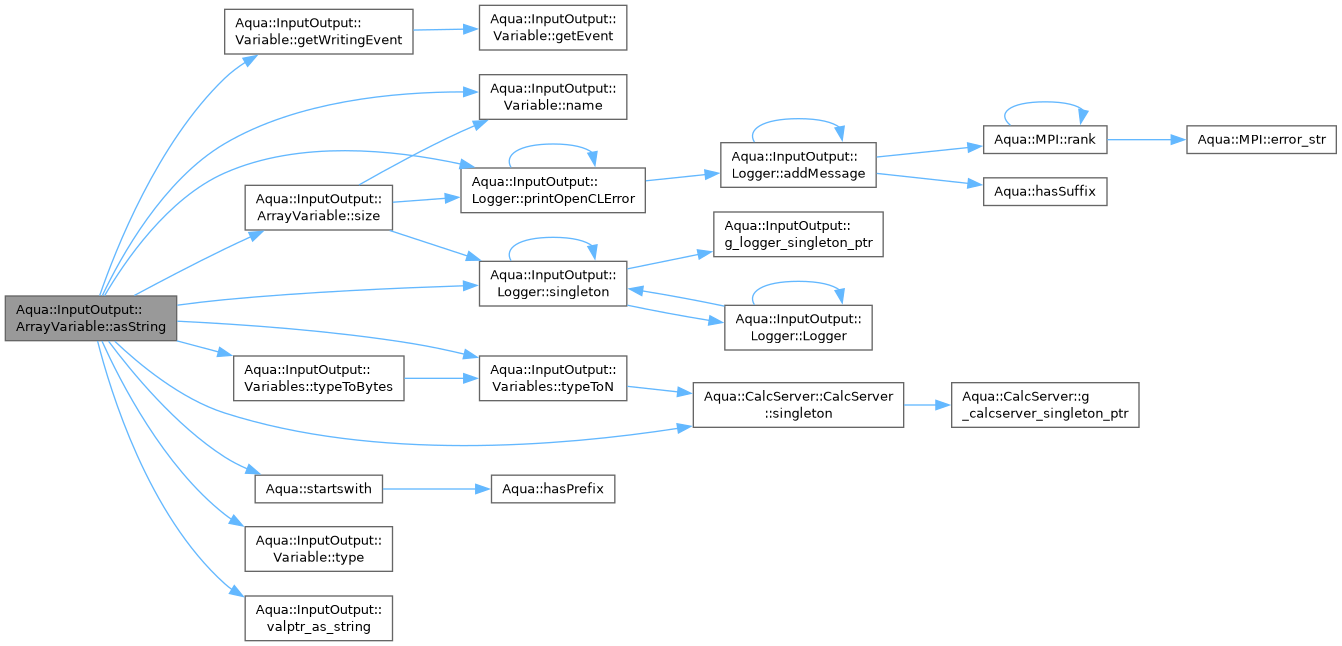
◆ get()
|
inlinevirtual |
Get variable pointer basis pointer
- Parameters
-
synced Unused parameter
- Returns
- Implementation pointer.
Reimplemented from Aqua::InputOutput::Variable.
◆ getPythonObject()
| PyObject * Aqua::InputOutput::ArrayVariable::getPythonObject | ( | int | i0 = 0, |
| int | n = 0 ) |
Get a PyArrayObject interpretation of the variable
- Parameters
-
i0 First component to be read. n Number of component to be read, 0 to read all available memory, i.e. All the array after i0.
- Returns
- PyArrayObject Python object. NULL if the memory cannot be read.
Here is the call graph for this function:
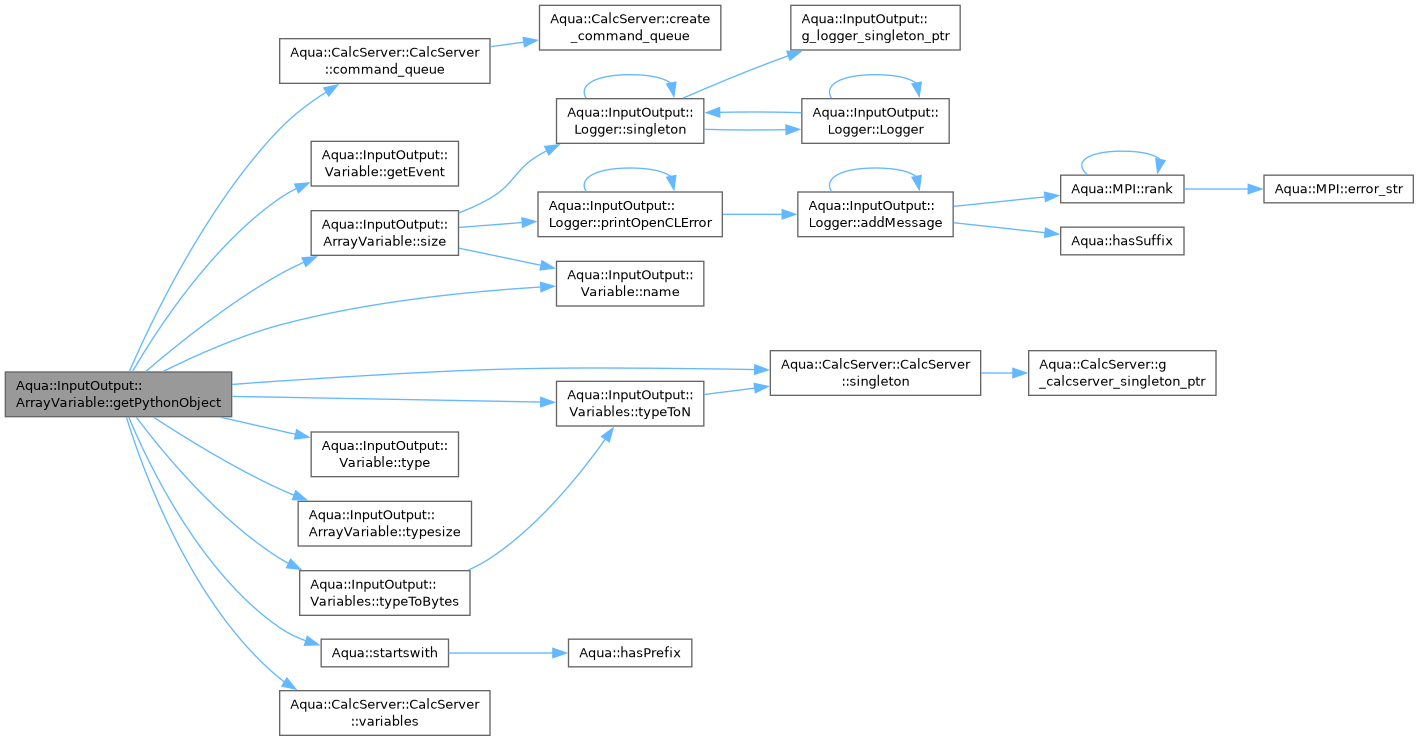
◆ isArray()
|
inlinevirtual |
◆ reallocatable() [1/2]
|
inline |
Get if a variable is reallocatable.
- Returns
- true if the variable is marked as reallocatable, false otherwise
◆ reallocatable() [2/2]
|
inline |
Set if a variable is reallocatable.
- Parameters
-
is true if the variable is reallocatable, false otherwise
- Note
- Non-reallocatable variables are in general way more efficient
◆ set()
|
virtual |
Set variable from memory
- Parameters
-
ptr Memory to copy. synced Unused parameter
- Exceptions
-
std::runtime_error if the variable is not reallocatable and it has been already set
Reimplemented from Aqua::InputOutput::Variable.
Here is the call graph for this function:

◆ setFromPythonObject()
| bool Aqua::InputOutput::ArrayVariable::setFromPythonObject | ( | PyObject * | obj, |
| int | i0 = 0, | ||
| int | n = 0 ) |
Set the variable from a Python object
- Parameters
-
obj PyArrayObject object. i0 ignored parameter. n ignored parameter
- Returns
- false if all gone right, true otherwise.
Here is the call graph for this function:
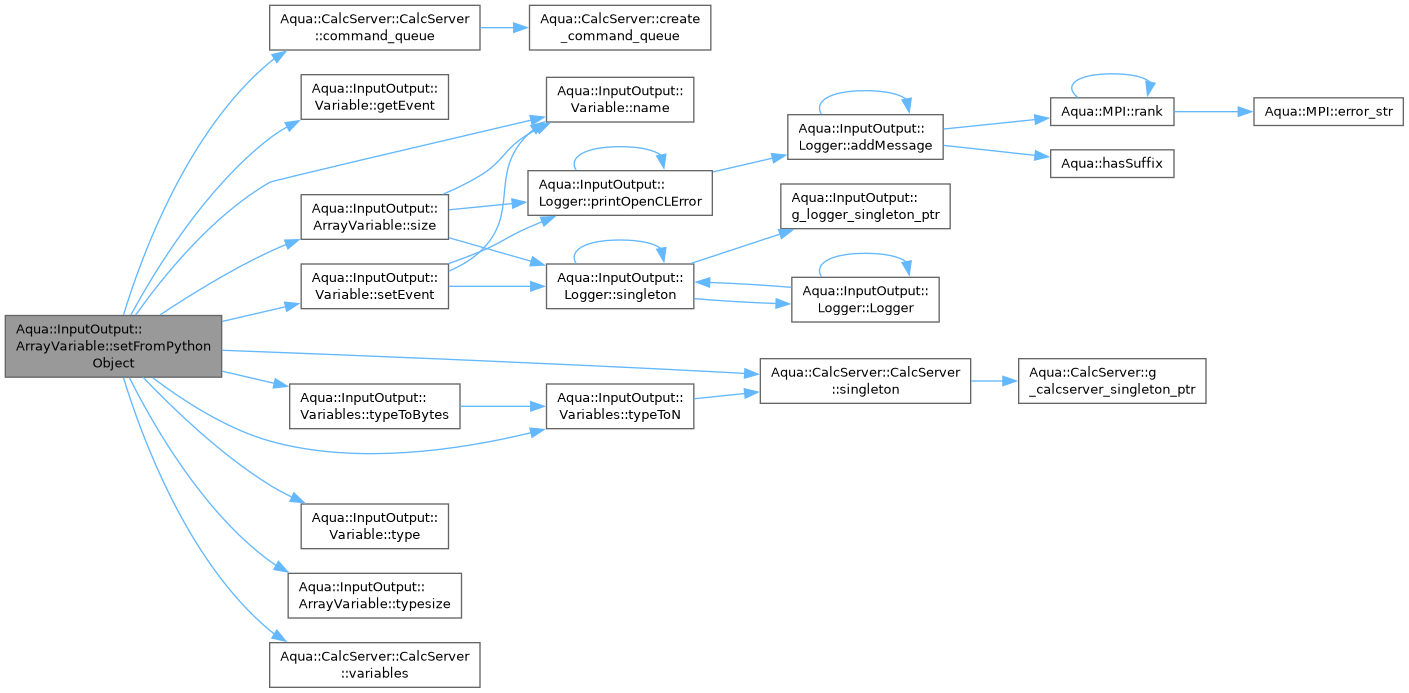
◆ size()
|
virtual |
Get the array size.
- Returns
- Array allocated memory (in bytes)
- Note
- In order to get the length of the array the command size() / Variables::typeToBytes(type()) can be used
Reimplemented from Aqua::InputOutput::Variable.
Here is the call graph for this function:

◆ typesize()
|
inlinevirtual |
Get the cl_mem type size.
- Returns
- cl_mem type size (in bytes)
- Note
- In order to know the typesize of the components into the array you may use Variables::typeToBytes()
Reimplemented from Aqua::InputOutput::Variable.
The documentation for this class was generated from the following files:
- /home/pepe/SPH/Code/aquagpusph/aquagpusph/Variable.hpp
- /home/pepe/SPH/Code/aquagpusph/aquagpusph/Variable.cpp
Generated by